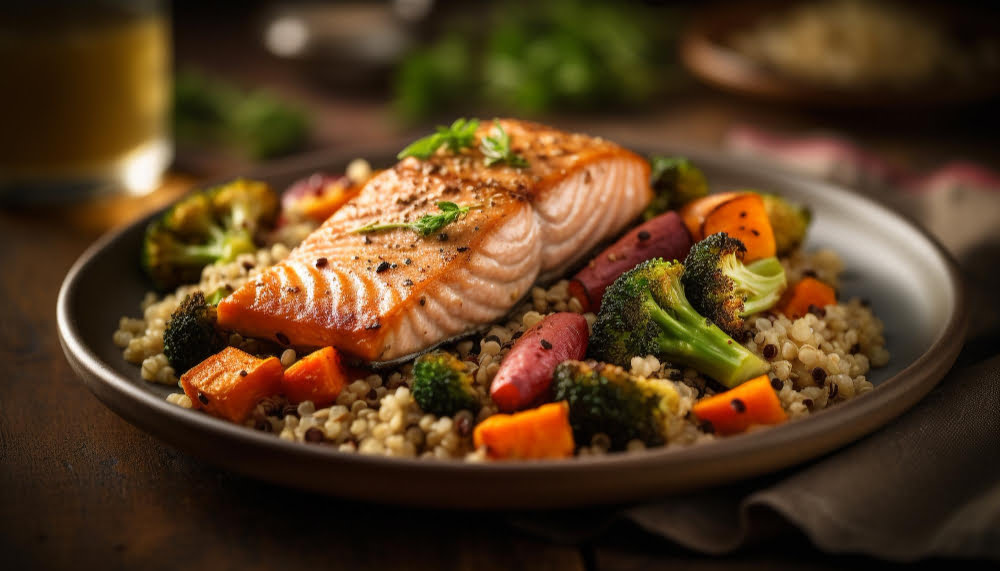FREE SHIPPING OVER $50
Free 7 Day Meal Plan for Ulcers: Breakfast, Lunch & Dinner
Navigating through ulcer treatment can be challenging, especially when it comes to nutrition. Having a well-structured meal plan can make a significant difference in maintaining strength, energy, and overall well-being. Our 7 day meal plan for ulcers is designed to provide balanced, nutrient-rich meals that support the body during treatment and recovery.
Download: 7 Day Meal Plan for Ulcers PDF
Key Takeaways:
Understanding Nutrition During Ulcer Treatment

Ulcers and their treatments can significantly affect appetite, digestion, and nutrient absorption. It’s essential to focus on foods that are gentle on the stomach, easy to digest, and packed with essential nutrients. This diet plan for ulcers emphasizes whole foods, lean proteins, healthy fats, and plenty of fruits and vegetables to support the body’s needs.
Foods to Avoid on an Ulcer-Friendly Diet
Certain foods can exacerbate ulcer symptoms or hinder recovery. It’s important to avoid:
- Spicy and acidic foods: These can irritate the stomach lining.
- Caffeine and carbonated beverages: These can increase stomach acid production.
- Alcohol: It can irritate the stomach lining and interfere with treatment.
- Fried and greasy foods: These can cause discomfort and slow digestion.
- Processed foods: They often contain additives that can irritate the stomach.
Foods to Eat on an Ulcer-Friendly Diet
Ulcer patients should focus on nutrient-dense foods that support overall health and well-being. Recommended foods include:
- Lean proteins: Chicken, fish, and plant-based proteins like beans and lentils.
- Fruits and vegetables: Rich in vitamins, minerals, and antioxidants.
- Whole grains: Brown rice, quinoa, and whole wheat products.
- Healthy fats: Avocados, nuts, seeds, and olive oil.
- Hydrating fluids: Water, herbal teas, and broths.
Benefits of a Tailored Meal Plan
- Maintains Strength and Energy: Adequate nutrition helps combat fatigue and maintain muscle mass.
- Supports Immune Function: Nutrient-dense foods boost the immune system, aiding in recovery.
- Manages Treatment Side Effects: Certain foods can help alleviate nausea, mouth sores, and digestive issues.
- Promotes Overall Well-being: Balanced meals improve mood and quality of life.
- Enhances Treatment Effectiveness: Proper nutrition can enhance the efficacy of ulcer treatments.
Adjustments for Different Types of Ulcers
- Peptic Ulcer: Focus on foods that reduce stomach acid, like bananas, melons, and oats.
- Gastric Ulcer: Opt for smaller, frequent meals and avoid spicy or acidic foods.
- Duodenal Ulcer: Include fiber-rich foods like whole grains, fruits, and vegetables.
7 Day Meal Plan for Ulcers
Here is a structured 7-day meal plan for ulcers that can be followed or modified according to individual needs and preferences. Remember to stay hydrated and consult with a healthcare provider for personalized advice.
| Day | Breakfast | Lunch | Snack | Dinner |
|---|---|---|---|---|
| Monday | Oatmeal with honey and bananas | Chicken and rice soup | Greek yogurt with honey | Baked salmon with quinoa and broccoli |
| Tuesday | Smoothie with aloe vera juice, blueberries, and spinach | Turkey wrap with avocado | Apple slices with almond butter | Turkey stir-fry with brown rice |
| Wednesday | Scrambled eggs with spinach | Lentil soup with carrots and celery | Carrot sticks with hummus | Baked chicken with sweet potatoes and beans |
| Thursday | Overnight oats with chia seeds and berries | Tuna salad with whole-grain crackers | Mixed nuts | Grilled shrimp with couscous and asparagus |
| Friday | Whole-grain toast with avocado and egg | Quinoa salad with cucumbers and tomatoes | Celery sticks with cream cheese | Beef stew with carrots and potatoes |
| Saturday | Cottage cheese with pineapple | Turkey wrap with lettuce and tomato | Smoothie with kale, pineapple, coconut water | Baked cod with wild rice and spinach |
| Sunday | Berry parfait with granola | Vegetable minestrone soup | Rice cakes with peanut butter | Grilled tofu with stir-fried veggies and rice |
Download: 7 Day Meal Plan for Ulcers PDF
How Can an Ulcer-Friendly Diet Influence Your Health?
Adopting an ulcer-friendly diet can have profound effects on your overall health and well-being, especially during treatment and recovery. Here’s how:
- Boosts Immune System: Nutrient-dense foods strengthen the immune system, helping your body fight off infections and recover more effectively.
- Reduces Inflammation: Anti-inflammatory foods can help reduce the chronic inflammation often associated with ulcers and their treatments.
- Improves Digestion: A balanced diet with plenty of fiber can help alleviate digestive issues and improve nutrient absorption.
- Enhances Mood and Mental Health: Good nutrition is linked to better mental health, helping to reduce stress, anxiety, and depression.
- Supports Treatment Efficacy: Proper nutrition can improve the effectiveness of ulcer treatments, potentially leading to better outcomes.
Key Nutritional Tips
Take Small Frequent Meals
Eating smaller, more frequent meals can help manage ulcer symptoms effectively.
Why It Works:
- Easier on the Stomach: Large meals can place additional stress on the stomach lining, potentially worsening ulcer-related discomfort.
- Symptom Management: Smaller meals are easier to digest and reduce the risk of triggering symptoms like pain, bloating, or acid reflux.
How to Implement:
- Meal Frequency: Aim for 5-6 smaller meals throughout the day rather than 3 large ones.
- Nutrient Density: Include nutrient-dense foods to maintain energy levels and support overall health.
Protein-Rich Foods
Protein is crucial for healing and tissue repair, which is vital for those with ulcers.
Why It Works:
- Tissue Regeneration: Ulcers can damage the stomach lining, and protein supports the regeneration of these tissues.
- Maintains Strength: Adequate protein intake helps maintain muscle mass and overall strength during recovery.
How to Implement:
- Protein Choices: Include lean proteins such as chicken, fish, tofu, beans, and dairy products.
- Digestibility: Opt for easily digestible protein sources to minimize strain on the digestive system.
Stay Hydrated
Proper hydration is essential for overall health and can help manage ulcer symptoms.
Why It Works:
- Fluid Balance: Staying hydrated supports overall body functions and digestion.
- Symptom Relief: Hydration can help alleviate some symptoms like stomach pain and discomfort.
How to Implement:
- Fluid Choices: Drink plenty of water, herbal teas, and clear broths throughout the day.
- Avoid Dehydration: Ensure you’re drinking fluids regularly, especially during meals.
Colorful Vegetables and Fruits
A variety of colorful vegetables and fruits provide essential vitamins and minerals.
Why It Works:
- Nutrient Diversity: Different colors in fruits and vegetables indicate a range of nutrients that are beneficial for health.
- Antioxidants: These foods are rich in antioxidants, which can help reduce inflammation and promote healing.
How to Implement:
- Variety: Aim to include a rainbow of colors in your diet.
- Serving Size: Incorporate vegetables and fruits into every meal for maximum benefit.
Avoid Alcohol
Avoiding alcohol can prevent exacerbating ulcer symptoms and support overall recovery.
Why It Works:
- Interference: Alcohol can interfere with the effectiveness of ulcer treatments and worsen symptoms.
- Immune Support: Avoiding alcohol helps keep the immune system strong and functioning properly.
How to Implement:
- Substitutes: Replace alcoholic beverages with water, herbal teas, or non-alcoholic alternatives.
- Awareness: Be mindful of hidden alcohol in cooking or processed foods.
Conclusion
Following a 7-day meal plan for ulcers can provide the necessary nutrients to support the body during treatment and recovery. Coupled with regular, gentle exercise, this diet plan can help improve overall well-being, manage treatment side effects, and enhance the effectiveness of ulcer therapies. Always consult with a healthcare provider or dietitian for personalized advice.
Related Articles
If you found this blog post insightful, explore more by delving into our related articles:
- Free 7-Day Full Liquid Diet Menu PDF: Your Complete Guide
- Free 21 Day Anti-inflammatory Diet PDF
- Free 21-Day Fatty Liver Diet Plan
- Free 7-Day Gallbladder Diet Menu Plan
- Free 7-Day Meal Plan for Cancer Patients
- Free 7-Day Metabolic Confusion Meal Plan
- Free 7-Day Meal Plan for Pancreatitis
- Free 7-Day Meal Plan for Crohn’s Disease
- Ulcerative Colitis Diet: Meal Plan for Symptoms







